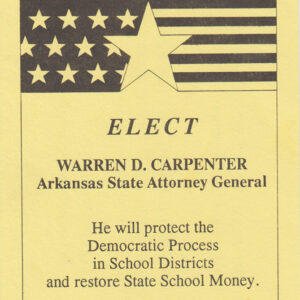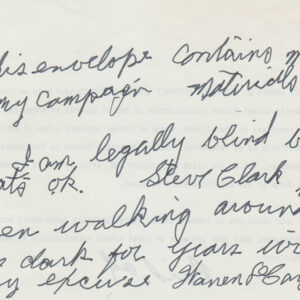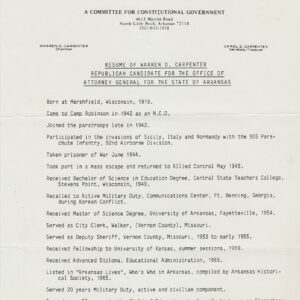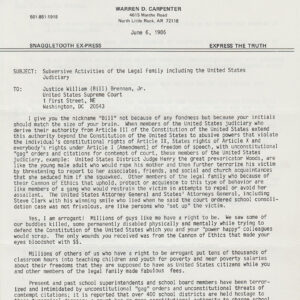calsfoundation@cals.org
Warren Durkee Carpenter (1919–2000)
Warren Carpenter was an Arkansas educator, political activist, and conspiracy theorist who, in the 1980s and 1990s, represented the high point of fringe candidacies during the years that Republicans held a tiny minority in Arkansas with rare electoral successes. A non-lawyer who sought legal office, a former teacher and administrator who promoted ideas far from the realm of educated thought, Carpenter pursued his ends to the ruin of his reputation and his health.
Warren Durkee Carpenter was born on February 21, 1919, in Marshfield, Wisconsin, the next to youngest of nine children of William H. Carpenter, described the 1920 census as a laborer, and Carrie N. Carpenter. He served in the U.S. Army in World War II in France with the Eighty-Second Airborne Division. Near the war’s end, he was stationed at Camp Joseph T. Robinson in North Little Rock (Pulaski County), where he met Carol Elizabeth Palmer. They were married in December 1945 and had two sons, Warren Dennis and James Taylor, and two daughters, Gail Elizabeth and Maurie Jean.
After obtaining a teaching degree on the GI Bill at what is now University of Wisconsin–Stevens Point, Carpenter taught elementary school and was a band director in Hancock, Wisconsin. The family returned to Arkansas in 1950, where Carpenter worked as a teacher and administrator in the Jacksonville (Pulaski County) and Little Rock (Pulaski County) school districts. Carpenter gained his master’s degree from the University of Arkansas (UA) in Fayetteville (Washington County) in 1952. He served in 1958 as principal of Lee Elementary School before transitioning back to teaching duties in 1966 at Little Rock Central High School, teaching history and music. Carpenter took a health-related retirement in the early 1970s.
Carpenter in retirement increasingly turned his attention to attacks on federal judges and openly questioned their authority to preside over certain cases, specifically the long-running Pulaski County school desegregation case that began in 1982. Over the next sixteen years, Carpenter filed multiple briefs against a series of presiding judges in the case, directing his sharpest ire at the original presiding judge, Henry Woods. He soon extended his targets to federal judges G. Thomas Eisele and Richard S. Arnold, the latter of whom served on the Eighth Circuit Court of Appeals, openly accusing them of “treason.” Not only did he file his own briefs, which were always dismissed, but afterward he would publicly call for their impeachment after loudly confronting them in court. In some instances, marshals would have to restrain Carpenter and remove him from the courtroom.
He decided to take this attention-grabbing behavior into the political arena in 1986, years after announcing for, but not filing for, a seat on the Little Rock School Board in 1977. He was an early filer in the Republican primary for attorney general, although he was not a lawyer. (In fact, the Arkansas Constitution does not require the state’s top legal officer to be a lawyer.) He claimed to be running because he had evidence that federal judges had corrupted state and local officials and the state’s congressional delegation. On his status as a non-attorney, Carpenter answered, “The fact that I’m filing shows that I know more about the Constitution than most lawyers do.” Suffering from sight impairment, he was unable to campaign extensively, and when he did, Ralph Forbes, a former member of the American Nazi Party and candidate for lieutenant governor, served as Carpenter’s driver. Instantly recognizable with his goatee and the thick lenses in his glasses, he still attempted to stage public confrontations with federal judges during the race, though his opponent, Attorney General Steve Clark, ignored him. He pledged to make up his lack of legal training by hiring “smart lawyers,” but Carpenter came away with less than twenty percent of the vote.
His failed race did not silence him; he only got louder and made more-outlandish claims, which he began publishing in a pamphlet he called “The Snaggletooth Express.” In late 1987, Carpenter made the claim that the Central Intelligence Agency (CIA) was bombarding his mobile home in Little Rock with gamma radiation and that he was under surveillance by the Federal Bureau of Investigation (FBI). He further claimed that the attacks were part of a conspiracy against him by President Ronald Reagan, state Republican Party chair and former congressman Ed Bethune, Governor Bill Clinton, former president Jimmy Carter, and even his former ally, ex-Nazi Ralph Forbes, who were all, he asserted, in on the plot. He told an Arkansas Gazette reporter that it was all about an “International Scheme to take over the world” because Reagan did not respond to a 1984 letter claiming that federal judges were trying to take over public schools.
Bethune and the GOP disavowed Carpenter, and the FBI denied any interest in him. But it did not deter him from running for Congress in the Second District in 1988 against incumbent Democrat Tommy Robinson. He continued confronting Judge Woods and attempting to stage what he called “sit-ins” in his courtroom, and he was once briefly jailed. He repeatedly demanded that U.S. Attorney Chuck Banks charge the judge with treason, but Banks ignored him, as did Robinson during the campaign. While Carpenter claimed that he “wanted to be known as a “legally blind statesman rather than some politician stumbling around in the dark with no excuse,” he only secured seventeen percent of the vote against Robinson.
Carpenter’s claims were being increasingly dismissed and ignored, and his political pursuits were going in the same direction. In 1990, he tried again for attorney general but was crushed by future governor Asa Hutchinson in the Republican primary. Democrat Winston Bryant won the general election. Carpenter was convicted the next year by the Arkansas Supreme Court of practicing law without a license and was hit with federal court judgments totaling $15,000. He attempted to file to run for chief justice in 1992 against incumbent Jack Holt Jr., stating, “They say justice is blind, and I want to be the first blind Chief Justice.” However, there was a qualification to have practiced law for eight years, and his papers were denied. He claimed that a conspiracy by federal officials cost him his marriage. In a final bid for office, he sought the post of Pulaski County prosecuting attorney in 1994 but again was soundly defeated by Democrat Mark Stodola after the county GOP committee openly disavowed him.
Carpenter was among the last of the fringe candidates attracted to the Republican Party by low filing fees, as in 1994 the Arkansas Supreme Court ruled that the state must start paying for the cost of the primaries. From there, the fees charged by both parties began to equalize, discouraging underfinanced eccentrics like Carpenter.
Carpenter’s physical and emotional health went into rapid decline in the 1990s, and he spent his final years in a veterans’ home in Missouri. He died in the Veterans Administration hospital in Springfield, Missouri, on April 21, 2000.
For additional information:
Arbanas, Michael. “Contenders in 2nd District Hardly Dull; Neither Robinson nor Carpenter Is Enamored with His Own Party.” Arkansas Gazette, November 6, 1988, p. 5N.
“Carpenter Announces Bid for Chief of Supreme Court.” Arkansas Democrat-Gazette, March 6, 1992, p. 5A.
Elrod, Mark, and Tom Howard. “Meet Warren Carpenter: Political Scientists Review 1988 Election Results.” The Bison, December 9, 1988, p. 3.
“Faubus Files for Nomination; His Fee Donated by 5 ‘Newspaper Friends.’” Arkansas Gazette, March 21, 1986, p. 5A.
“Impeach Three Judges, GOP Candidate Urges.” Arkansas Gazette, August 15, 1986, p. 7B.
“New Lee Principal.” Arkansas Democrat, September 28, 1958, 7D.
Van Laningham, Scott. “His Home Is under Radiation Attack, Reagan in on It, GOP Candidate Says.” Arkansas Gazette, April 7, 1988, p. 9A.
“Warren Durkee Carpenter.” Find a Grave. https://www.findagrave.com/memorial/38229999/warren-durkee-carpenter (accessed November 1, 2023).
Wells, Bob. “Clark-Carpenter Race for Attorney General Low-Key, Unusual.” Arkansas Gazette, October 26, 1986, p. 6A.
Revis Edmonds
Arkansas Department of Parks, Heritage, and Tourism
 Divergent Prosperity and the Arc of Reform, 1968–2022
Divergent Prosperity and the Arc of Reform, 1968–2022 Politics and Government
Politics and Government Carpenter Campaign Letter
Carpenter Campaign Letter  Carpenter Campaign Note
Carpenter Campaign Note  Warren Carpenter Resume
Warren Carpenter Resume  Snaggletooth Ex-Press
Snaggletooth Ex-Press 




Comments
No comments on this entry yet.